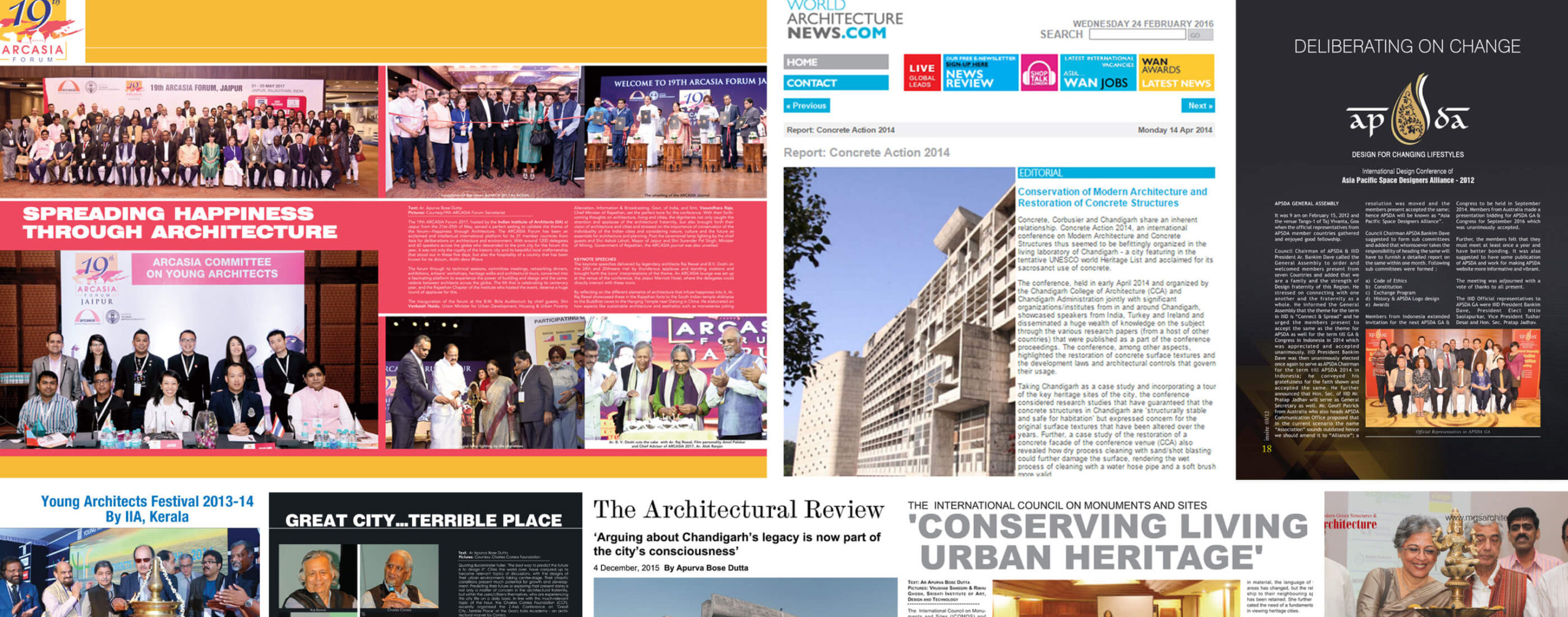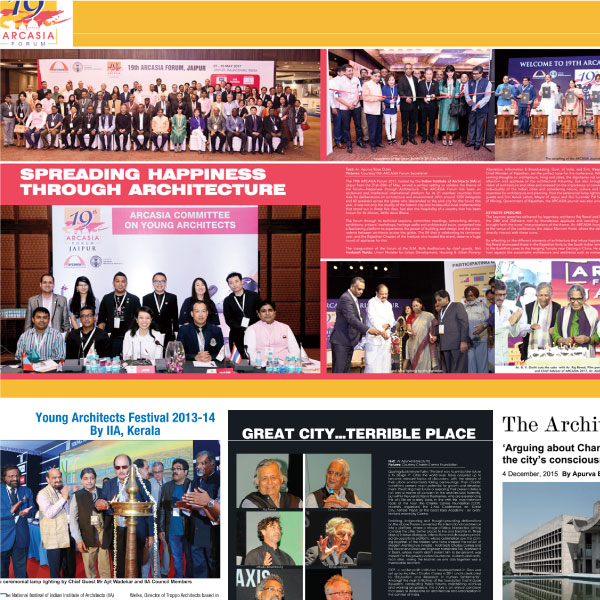02 Nov Apurva Bose Dutta


I believe that women by nature possess an inherent indomitable strength, which pushes them to keep on building and innovating new paths in life.
Treading on the ‘unconventional’ path of architectural writing 14 years ago, when it hadn’t been enthusiastically followed full-time in India earlier, demanded a lot of courage, determination, and perseverance; but I believe that women by nature possess an inherent indomitable strength, which pushes them to keep on building and innovating new paths in life.

A career that began without any explored paths to emulate, faced many challenges—of minimal literature and concrete source of information on the subject in India. It was essential to analyse and implement why the relevance that architectural writing had overseas, was missing here. I had to discover answers that would encourage others to pursue the path. Witnessing the way architectural writing has flourished over time, today, I look back at this stimulating journey, with gratification and happiness.

What began as an ideal combination of a degree (architecture) and hobby (writing), has over the years materialised in the voicing of the need of architecture writers, critics, curators to drive discourses. A journey that started as ‘writing on architects-projects’ has evolved to discussing architecture and its impact and trying to discover the missing language connecting architects, designers, cities, authorities, and the common man. The initial years of working with 1–2 magazines full-time, has evolved into a ‘freelancing-independent zone’, allowing me the liberty to associate with varied multimedia, reach diverse listeners, and study miscellaneous architects-projects. Spearheading the first magazine issue in India (under IIA) in 2013, dedicated completely to architectural journalism, was my big achievement towards the realisation of the subject.

Notions exist that women pursue alternative fields in architecture to escape the gender divide in the hardcore profession. I believe that today the emancipated woman will not make a career choice to establish herself in a society that is, in any case, shunning this man-woman divide. My career choice was never driven by what the society expected of me to do, or what support the society could offer in terms of what I wanted to do. It was purely driven by a desire to pursue and unearth the importance of the subject to architecture-design.
My roles today are much more extroverted: they are are not limited to merely writing/covering/discoursing architecture-design-planning and their influence on the development of a nation.
Today, my roles of a writer have been extended to becoming an author, an editor, a curator, interested in communicating architecture through various mediums of print, digital and broadcast by associating with organisations, institutions, firms and media houses related to the AEC Industry.

I have been trying to put into use the vast amount of knowledge that I have gathered in my journey of architectural journalism, by writing, speaking on professional platforms, conceptualising, curating and hosting events around architecture-design. I get the opportunity to travel globally and interact with experts connected to the industry. Representing the Indian delegation of architectural writers at the media visits organised by the Australian and Finland governments in the last 2-3 years gave me an occasion to exchange notes on architecture and design with experts across the world and take the discussion around the subject much deeper.

One of my defining achievements in the last two years has been debuting as an author with my book, ARCHITECTURAL VOICES OF INDIA: A Blend Of Contemporary and Traditional Ethos. The book is a medium for 19 renowned Indians architects across generations and specialisations, to converse and address topics related to the global evolution of architecture.

The diversity of thoughts offset by the very similar core values of design the architects possess is the USP of the book. My roles today are much more extroverted: they are are not limited to merely writing/covering/discoursing architecture-design-planning and their influence on the development of a nation. There is also shouldering of the primary responsibility of advocating the subject in India at larger scales. Indian architectural curriculum lacks proper training in architectural writing.
To combat the same, I continue giving frequent talks at academic and professional platforms, curating and moderating discussions and conferences, and conducting workshops for students and faculty. Recently, I curated a national level essay competition for architectural students in India, which not only acted as an ideal platform for them to display their articulative skills, but in turn, also underlined what is missing in architectural writing in India today, and the rectifications that should follow.
India is blessed to have diversity in its history and culture that reflects in the built environment here or can be the foundation for the newer built environs
14 years ago, the Indian society was different—there was hardly any discussion on women in architecture, and the society was not accepting of alternative careers.

For me, the future must be a time when there will be NO need to talk about ‘women in architecture’ because architecture would be genderless! There would be no need to talk about ‘alternative careers’ because many of them, including architecture writing, would have become mainstream.

I plan to not only continue communicating and discussing architecture-design across the world but also contribute towards making architecture writing and critiquing mainstream in India. Architecture-design affects human psychology profoundly; unfortunately, its discussion has been minimal in India. Communications surrounding it must become mandatory!
My vision also includes more intensive training of interested architectural writers that could lead to their greater flourishing in India. Their critical and analytical thinking and writing skills would positively revolutionise the face of design media in India. I look forward to collaborating with architectural institutions and organisations, media houses, and powerheads, such as the Council of Architecture to make the subject mainstream and mandatory in the architecture curriculum, offer proper training in it, and enhance its acknowledgement—in terms of its visibility, and a higher financial pedestal.

Surprisingly, I have witnessed a greater interest in women towards this subject in India even when a lot of men are stepping on this newly discovered path. Probably the reasons are of women more willing to take risks, and the wrong notion of architecture writing being a good escape route for women from architecture. My vision, however, stays towards the subject, irrespective of the gender that takes it up. I work towards a subject that is cherished by everyone, whose relevance and becoming mainstream is realised by everyone! India is blessed to have diversity in its history and culture that reflects in the built environment here or can be the foundation for the newer built environs. The art of critiquing, and the subject of architectural writing then, surely holds significant promise to lead the nation on to the world architecture map.
Apurva Bose Dutta
DESIGN FIELD
Architecture Writing, Editing, Curating, Research, Documentation, Photography
LOCATION
Bengaluru, India
STUDIO NAME
ABOUT
Ar. Apurva Bose Dutta is a Bengaluru-based author and award-winning architectural journalist. In her career of 14 years, she has developed extensive expertise in writing, researching, editing and curating architecture and design content. Her academic background (B.Arch, Chandigarh College of Architecture; Diploma in freelance journalism, UK) are further explored in her additional roles, of a professional speaker, conducting and curating architecture and design content, discourses for the print and digital media, workshops, and consulting for academic and professional industry initiatives.
Her professional journey has seen global collaborations with multimedia architecture and design publications, publishing houses, firms, organisations and institutions in India, UK, US, Karachi, Italy, Indonesia, Singapore and Canada.
Apurva has been a pioneer in increasing the visibility of the subject of architectural writing in India. She is credited with the conceptualisation of the first magazine issue dedicated to architectural journalism in India. She has been invited by the Australian Government and Finland Government to represent the Indian delegation in International Media Visits of Architectural Writers in Melbourne (2016) and Helsinki (2018) respectively. Her book, ARCHITECTURAL VOICES OF INDIA: A Blend of Contemporary and Traditional Ethos (published by Cambridge Scholars Publishing, UK, 2017) has received wide acclaim and coverage.


